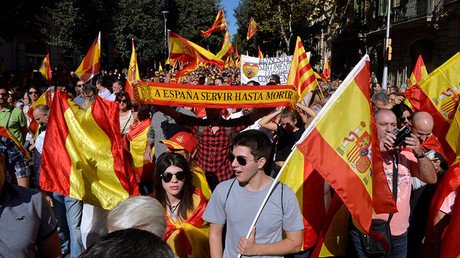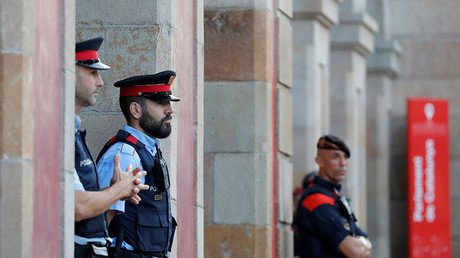Spain hopes mass business exodus ends Catalonia's independence dream

The flight of Spain's top corporations from Catalonia has turned into a stampede due to mounting fears of an unstable business environment. Madrid has unleashed perhaps it's scariest weapon to thwart the region's independence bid - fear of poverty.
Before Catalonian leaders announced their independence decision, the Spanish government changed the law making it easier for corporations to move their headquarters to other parts of the country.
Major Spanish banks Banco Sabadell and CaixaBank were among the first, moving headquarters to Alicante and Valencia “to protect the interests” of customers, shareholders, and employers. CaixaBank said it wanted to avoid the risk of finding itself illegally headquartered outside the eurozone should Catalonia become independent.
Spanish utility Gas Natural Fenosa and satellite broadband Eurona have announced moving legal bases to Madrid. Infrastructure firm Abertis Infraestructuras, Cellnex Telecom, real-estate company Inmobiliaria Colonial, textile firm Dogi International Fabrics have joined the flow of companies fleeing the region. They said they would relocate headquarters to Madrid, at least temporarily.
Prosecco and wine-makers Freixenet and Cordoniu are both looking at relocating their offices, but a decision hasn't been taken yet. Some of Spain’s largest firms are also debating whether to move their headquarters.
Catalonia is Spain's most economically productive region, hosting 7,100 multinationals, including Volkswagen, Nissan, and Cisco. It generates about 20 percent of the country's GDP and contributes 21 percent of its total taxes.
Losing Catalonia would deprive Spain of about 16 percent of its people, a fifth of its economic output and more than a quarter of its exports. But at the same time, analysts predict, the mass exodus of companies would cause devastating economic consequences for the region.
“It’s the death knell for the separatists' science fiction view of their economic position, and the evidence of the disaster of the separatist economy,” Chief Economist at Tressis, Daniel Lacalle told RT.
Catalans, who support independence, believe the region could turn its budget into surplus after stopping transfers to the federal government. Lacalle claims their calculations are simply a fantasy.
“Even in their transition document they concede they will have to finance themselves through patriotic bonds and bonds payable by higher future taxes,” he said, adding that the reality is that “their alleged transfers to the rest of the state are not enough to cover their financing needs plus the cost of secession.”
According to the economist, “this would lead to an annual deficit of around €16 billion being conservative, and that is before the loss of revenues from the companies that have left.”
Spain's Minister of Economy Luis De Guindos blamed the Catalan government for the businesses’ moving, saying it is the consequence of the policies put in place by the regional government.
Jose Luis Feito, president of the Institute of Economic Studies, echoed the minister, saying the main consequences of the “illegal action” on behalf of independence will be mainly felt in the economy of Catalonia.
“An independent Catalonia will be outside of the European Union and outside of the common currency,” said Feito, adding “what companies are doing in Catalonia, particularly banks, are obviously protecting themselves and their customers and their shareholders from this possibility.”
The European Union (EU) has already said it won’t recognize an independent Catalonia and will not grant EU membership.
According to Lacalle, it is “impossible for Catalonia to survive without any EU recognition and it will not receive it. This destroys the secession argument.”
“It means the collapse in the economy as Catalonia sells more than 80 percent of its goods to the rest of the EU,” the expert said.
Spanish Prime Minister Mariano Rajoy on Wednesday accused the Catalan government of being “disloyal" and carrying out a "very dangerous attack on institutions as well as the coexistence of citizens which is worse.”
He said the referendum, in which two million Catalans voted to break away from Spain, resulted in disorder and prompted companies to flee the region.
While Catalonia's government has delayed the decision on making a unilateral declaration of independence this week, they remained defiant.
Catalan leader Carles Puigdemont said on Wednesday that the regional government is ready for dialogue “without preconditions" and that the relationship between Catalonia and Spain “does not work.”















